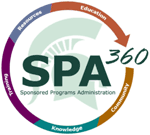SPA/OSP/CGA, in collaboration with SPROUT and an extensive network of MSU staff involved in pre-award, post-award and compliance aspects of research administration, provide the latest news, training, resources and information available to campus.
Essentials of Research Administration (ERA) Series
The ERA series provides on-campus training and certification for research administrators and other support staff who have responsibilities for research proposals, grants, contracts, pre- and post-award administration and related activity at Michigan State University.
Certification/Recertification Requirements:
- Initial Certification – Participants in the ERA program must attend all 5 ERA Cores plus a minimum of 3 ERA Electives within 2 calendar years to obtain the initial ERA certificate, which will be valid for 2 calendar years (beginning in the year you first started attending ERA classes).
- Recertification – In order to maintain ERA certification status, 2 ERA Electives (or equivalent approved research-related trainings) are required every calendar year after your initial certification period.
2018 Electives: Only 5 more ERA Electives will be offered through the end of this year. If you would still like to secure a seat, and are in need of ERA credits, please be sure to register on the ERA Registration Portal on the SPA/OSP/CGA website. If the session is already at maximum registration
capacity, please email Jennifer Lafferty at stumpje1@osp.msu.edu to be added to the waitlist.
2019 Schedule: The 2019 ERA schedule is currently being finalized, which will include the 5 Cores, 20 Electives, and eLearning options. Stay tuned for the SPA/OSP/CGA listserv announcement soon!
eLearning in D2L: Would you like to expand your research administration knowledge, but your schedule and availability is limited to attend one of our ERA in-seat classes? Take the International
Research eLearning Elective in D2L instead! This class features 4 modules focusing on topics from the following offices and presented live Fall 2017: Accounting, Office of Sponsored Programs/Contract and Grant Administration (Complex Budgeting & Accounting), Export Controls & Trade Sanctions, Office of Risk Management and International Health & Safety. If you would like to attend this virtual class (and earn ERA recertification credit), please contact Jennifer Lafferty (stumpje1@osp.msu.edu) and/or Shannon Lutz (lutzsha1@osp.msu.edu).
Upcoming: Another eLearning Elective on Contracts & Other Agreements will be available in D2L soon! Please look for the announcement on the SPA/OSP/CGA listserv.

Training Videos
SPA/OSP/CGA have created training videos to assist MSU research faculty and administrators, located on our website and on Kaltura MediaSpace: Award Search Report Demonstration (NEW!); Account Explorer (AE) Training Videos; International Subawardees Training Videos; Making it Real, Parts I & II
Kuali Coeus (KC) Training
KC-specific training on Beginner’s Hands-on Budgeting in KC and Proposal Development in KC are available through the ERA series. Additional training resources are also available on the following webpages:
- Job Aids & Videos – 20 job aids and 23 videos are available on various KC topics including proposal and budget development, reporting, and general information.
- System Updates – System implementation updates (posted biweekly) provide tips, instructions, bug fixes, training opportunities, system outages and more.
New Website Resources
We have created some new resources to assist faculty and administrators. Check them out!
- Website Resources: The “Welcome” page was expanded to include a “Get Started with These Resources” section. It lists some of our most commonly used webpages (separated by preaward and postaward) that would be helpful for faculty and administrators.
- Preaward College/Center Contacts: Includes a table of contact names and email addresses for preaward college/center contacts. The table was created to help faculty and research administrators find who the preaward contacts are for a college/center and to assist with proposal submissions or award transfers to MSU. Please note these contacts are as of Summer 2018. If you notice the contact information needs to be updated, please contact help@osp.msu.edu.
- OSP Proposal Timeline: To help faculty and administrators understand the MSU Proposal Submission Deadline Policy, the OSP Proposal Timeline visually shows the policy broken out by periods of time, with step-by-step activities and suggestions for each period.